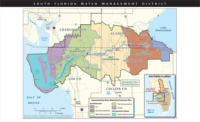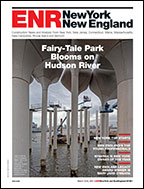Reacting to regulators' concerns over new sinkhole activity near Tampa Bay Water's regional reservoir, utility general manager Gerald Seeber has advised the agency board that he is moving to cancel the planned $42-million expansion of the facility. The pending $121-million renovation of the existing 15.5-billion gallon reservoir may still proceed, although the schedule will likely be delayed.


In a response to information provided by TBW related to permitting the project, an environmental administrator with the Florida Dept. of Environmental Protection—the project's permitting agency—cited recent sinkhole activity in the area, possibly from increased well pumping, as a potential reason to deny the permit.
"The adjacent maximum capacity irrigation well pumping for drought and freeze crop protection appears to create a dynamic, rather than stable, geologic setting for the reservoir," wrote FDEP’s Lisa Robertson. The agency cited several sinkholes that have developed in the area recently.
The Tampa region has experienced numerous sinkholes in recent years, sometimes shortly after farmers watered their crops to protect against killing frosts. In both 2010 and 2011, sinkholes impacted Interstate 4.
In a memorandum to TBW's board of directors, Seeber wrote: "FDEP is concerned with the potential for sinkhole development arising from the additional load posed by a reservoir facility with increased capacity." Essentially, the agency believes that "a larger reservoir is not a good idea at this location,” he added. Seeber assured the board that the current facility and the geology supporting it has “proven to be safe."
In 2011, TBW hired Kiewit Infrastructure Group, Omaha, and designer Gannett Fleming, Camp Hill, Pa., with a design-build contract for the renovation, valued at $121 million. The project team also includes Veolia Water North America-South. TBW has maintained the expansion as a separate project.
For the renovation, Kiewit plans to remove and reclaim the reservoir’s existing flat-plate soil cement and soil wedge, remove and replace the geomembrane layer, and add embankment fill, a drainage system and stair-step soil cement around the entire interior face. The design will enable a higher drawdown rate of approximately 120 MGD, compared to the previous rate of 66 MGD. The reservoir, completed in 2005, measures approximately 5 miles in circumference.
The move to cancel the expansion could affect the renovation's schedule. Approval of project financing was previously scheduled for the board’s next meeting on June 18. Seeber now expects August is the earliest a financing plan may be put before the board. He had previously told ENR that he expected the project to proceed to construction "sometime between Labor Day and Halloween." Kiewit is now revising the project’s construction drawings, he adds.
One benefit is that TBW’s "capital costs in the contract with Kiewit Infrastructure South will be substantially less," Seeber writes. "The agency should not seek financing until we are fairly certain about the schedule for approval of a permit."
Tampa Bay Water is currently seeking a new trial and appeal of its case against HDR Engineering, in which the utility had alleged faulty design. Last month, a federal jury ruled in favor of HDR. The result was an estimated $24 million in potential legal costs for the regional water authority. TBW pegged its own legal fees at $10.6 million, and estimated that HDR's bill, as prevailing party, would surpass $13 million.
TBW’s board had previously rejected HDR's settlement offer of $30 million. At trial, the utility's lawyers asked the jury for $73.25 million in damages; HDR had estimated that, with interest, that amount would have ballooned to more than $140 million.



